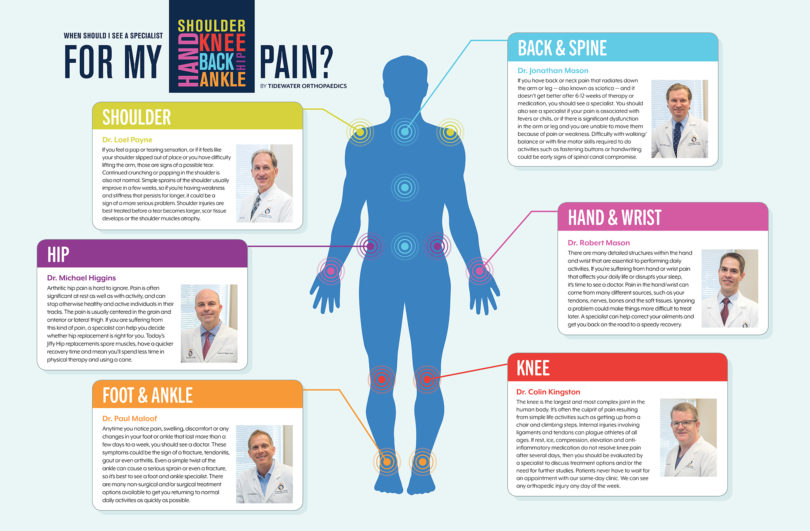Pain is a normal part of life, whether it’s a skinned knee or a bone fracture. But, how do you know your pain is severe and how long should you put up with your pain? Health Journal asked the doctors at Tidewater Orthopaedics, to help readers understand when they should see a specialist about their joint pain.
Shoulder
Dr. Loel Payne
If you feel a pop or tearing sensation, or if it feels like your shoulder slipped out of place or you have difficulty lifting the arm, those are signs of a possible tear. Continued crunching or popping in the shoulder is also not normal. Simple sprains of the shoulder usually improve in a few weeks, so if you’re having weakness and stiffness that persists for longer, it could be a sign of a more serious problem. Shoulder injuries are best treated before a tear becomes larger, scar tissue develops or the shoulder muscles atrophy.
Hip
Dr. Michael Higgins
Arthritic hip pain is hard to ignore. Joint pain is often significant at rest as well as with activity, and can stop otherwise healthy and active individuals in their tracks. The pain is usually centered in the groin and anterior or lateral thigh. If you are suffering from this kind of pain, a specialist can help you decide whether hip replacement is right for you. Today’s Jiffy Hip replacements spare muscles, have a quicker recovery time and mean you’ll spend less time in physical therapy and using a cane.
Foot & Ankle
Dr. Paul Maloof
Anytime you notice pain, swelling, discomfort or any changes in your foot or ankle joint that last more than a few days to a week, you should see a doctor. These symptoms could be the sign of a fracture, tendonitis, gout or even arthritis. Even a simple twist of the ankle can cause a serious sprain or even a fracture, so it’s best to see a foot and ankle specialist. There are many non-surgical and/or surgical treatment options available to get you returning to normal daily activities as quickly as possible.
Back & Spine
Dr. Jonathan Mason
If you have back or neck pain that radiates down the arm or leg — also known as sciatica — and it doesn’t get better after 6-12 weeks of therapy or medication, you should see a specialist. You should also see a specialist if your pain is associated with fevers or chills, or if there is significant dysfunction in the arm or leg and you are unable to move them because of pain or weakness. Difficulty with walking/balance or with fine motor skills required to do activities such as fastening buttons or handwriting could be early signs of spinal canal compromise.
Hand & Wrist
Dr. Robert Mason
There are many detailed structures within the hand and wrist that are essential to performing daily activities. If you’re suffering from hand or wrist pain that affects your daily life or disrupts your sleep, it’s time to see a doctor. Pain in the hand/wrist can come from many different sources, such as your tendons, nerves, bones and the soft tissues. Ignoring a problem could make things more difficult to treat later. A specialist can help correct your ailments and get you back on the road to a speedy recovery.
Knee
Dr. Colin Kingston
The knee is the largest and most complex joint in the human body. It’s often the culprit of pain resulting from simple life activities such as getting up from a chair and climbing steps. Internal injuries involving ligaments and tendons can plague athletes of all ages. If rest, ice, compression, elevation and anti-inflammatory medication do not resolve knee pain after several days, then you should be evaluated by a specialist to discuss treatment options and/or the need for further studies. Patients never have to wait for an appointment with our same-day clinic. We can see any orthopedic injury any day of the week.







